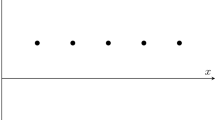Abstract
There is a widespread belief that the so-called process theories of causation developed by Wesley Salmon and Phil Dowe have given us an original account of what causation really is. In this paper, I show that this is a misconception. The notion of “causal process” does not offer us a new ontological account of causation. I make this argument by explicating the implicit ontological commitments in Salmon and Dowe’s theories. From this, it is clear that Salmon’s Mark Transmission Theory collapses to a counterfactual theory of causation, while the Conserved Quantity Theory collapses to David Fair’s phsyicalist reduction of causation.
Similar content being viewed by others
Notes
I will use the terms “ontology” and “ontological commitment” in a strict sense, as referring only to those entities that are ontologically basic. So, if an ontological theory for example defines molecules in terms of atoms and not vice versa, I will say that this theory is ontologically committed to atoms, but not to molecules.
One of the important consequences of this is that the criticisms of the Mark Transmission Theory which focus on the concept of “mark” (see Dowe 1992a, pp 200–202) miss the point. By stating that some pseudo-process can allow the transmittance of a mark, they criticize the test but not the theory itself, since its central statement, that only processes which possess permanent structural characteristic features can engage in causal interactions, remains untouched.
Note that Dowe still formulates immanent causation in terms of cause and effect, such as “A is the cause of B”. The idea that the notion of immanent causation implies a switch from thinking in terms of cause and effect to thinking in terms of “causation” as such, without reference to causes and effects, is therefore obviously untrue. (see Dowe 2000, p 52).
More correctly, Dowe rejects David Armstrong’s causal theory of identity, but this automatically entails rejecting Russell’s theory as well.
It should be noted that this does not mean that world lines or Minkowski diagrams are useless in se. It only means that they do not add any information to the CQT.
Of course, it can still be useful to make a distinction between causal objects and pseudo-objects instead, but this does not add any extra information which is not already contained in the definition of causal interactions. The CQ theory is only a theory of causal objects in the same way as the MT theory is a theory about causal processes. Dowe defines causal interactions as exchanges of conserved quantities. Of course, this implies that objects which do not possess such quantities cannot take part in a causal interaction. There is no need to state this explicitly in a different condition or definition. In any case, it is impossible that such a definition could contain extra ontological information.
The main difference is that Dowe has traded in Fair’s notion of a transfer of a conserved quantity fora n exchange of a conserved quantity, which makes his theory symmetrical. As a consequence, Dowe supplements his theory with some conditions which involve statistical correlations in order to distinguish between cause and effect. (see the final chapter of Dowe 2000)
References
Chakravartty, A. (2005). Causal Realism: Events and Processes. Erkenntnis, 63, 7–31.
De Vreese, L. (2006). Pluralism in the Philosophy of Causation: Desideratum or not? Philosophica, 5–13.
Dowe, P. (1992a). Wesley Salmon’s process theory of causality and the Conserved Quantity Theory. Philosophy of Science, 59(2), 195–216. Referred to as (Dowe 1992aa).
Dowe, P. (1992b). An Empiricist Defense of the Causal Account of Explanation. International Studies in the Philosophy of Science, 6, 123–128. Referred to as (Dowe 1992b).
Dowe, P. (1995). Causality and conserved quantities: a reply to Salmon. Philosophy of Science, 62(2), 321–333.
Dowe, P. (2000). Physical Causation. Cambridge: Cambridge University Press.
Fair, D. (1979). Causation and the Flow of Energy. Erkenntnis, 14, 219–250.
Handfield, T., Twardy, C., Korb, K., & Oppy, G. (2008). The Metaphysics of Causal Models. Erkenntnis, 68, 149–168.
Hitchcock, C. (1995). Salmon on explanatory relevance. Philosophy of Science, 62(2), 304–320.
Kitcher, P. (1989). Explanatory unification and the causal structure of the world. In P. Kitcher & W. Salmon (Eds.), Scientific Explanation, Minnesota Studies in the Philosophy of Science Volume XIII (pp. 410–506). Minneapolis: University of Minnesota Press.
Russell, B. (1948). Human knowledge. Its scope and limits. London: George Allen and Unwin LTD.
Russell, B. (1953). On the notion of cause, with applications to the free-will problem. In H. Feigl & M. Brodbeck (Eds.), Readings in the philosophy of science. New York: Appleton.
Salmon, W. (1984). Scientific explanation and the causal structure of the world. Princeton: Princeton University Press.
Salmon, W. (1994). Causality without counterfactuals. Philosophy of Science, 61(2), 297–312.
Salmon, W. (1997). A reply to two critiques. Philosophy of Science, 64(3), 461–477.
Author information
Authors and Affiliations
Corresponding author
Rights and permissions
About this article
Cite this article
Froeyman, A. The Ontology of Causal Process Theories. Philosophia 40, 523–538 (2012). https://doi.org/10.1007/s11406-011-9329-2
Received:
Revised:
Accepted:
Published:
Issue Date:
DOI: https://doi.org/10.1007/s11406-011-9329-2



